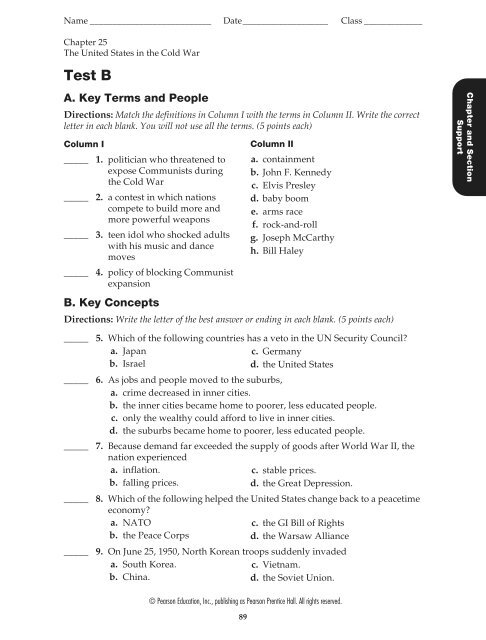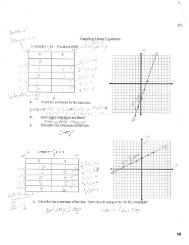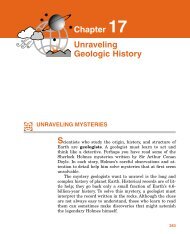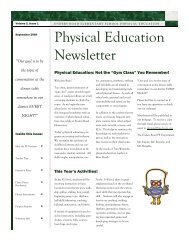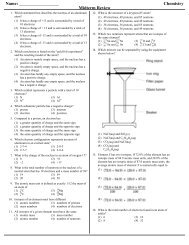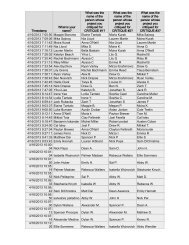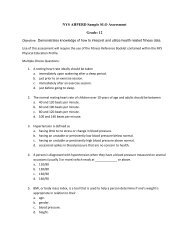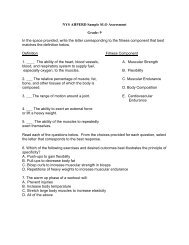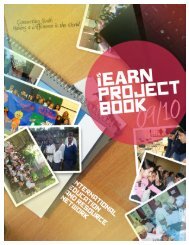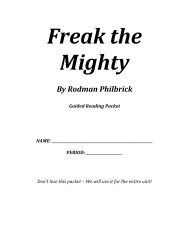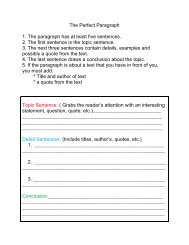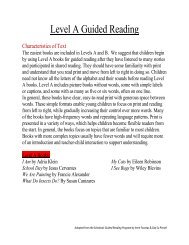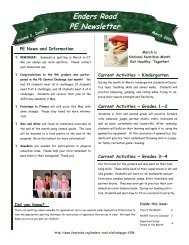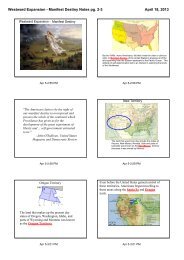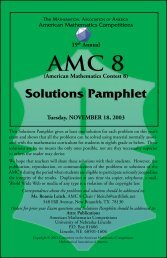Ch 25 Sample Test B
Ch 25 Sample Test B
Ch 25 Sample Test B
Create successful ePaper yourself
Turn your PDF publications into a flip-book with our unique Google optimized e-Paper software.
Name ___________________________ Date___________________ Class _____________<br />
<strong>Ch</strong>apter <strong>25</strong><br />
The United States in the Cold War<br />
<strong>Test</strong> B<br />
A. Key Terms and People<br />
Directions: Match the definitions in Column I with the terms in Column II. Write the correct<br />
letter in each blank. You will not use all the terms. (5 points each)<br />
Column I<br />
_____ 1. politician who threatened to<br />
expose Communists during<br />
the Cold War<br />
_____ 2. a contest in which nations<br />
compete to build more and<br />
more powerful weapons<br />
_____ 3. teen idol who shocked adults<br />
with his music and dance<br />
moves<br />
_____ 4. policy of blocking Communist<br />
expansion<br />
B. Key Concepts<br />
© Pearson Education, Inc., publishing as Pearson Prentice Hall. All rights reserved.<br />
89<br />
Column II<br />
a. containment<br />
b. John F. Kennedy<br />
c. Elvis Presley<br />
d. baby boom<br />
e. arms race<br />
f. rock-and-roll<br />
g. Joseph McCarthy<br />
h. Bill Haley<br />
Directions: Write the letter of the best answer or ending in each blank. (5 points each)<br />
_____ 5. Which of the following countries has a veto in the UN Security Council?<br />
a. Japan<br />
b. Israel<br />
c. Germany<br />
d. the United States<br />
_____ 6. As jobs and people moved to the suburbs,<br />
a. crime decreased in inner cities.<br />
b. the inner cities became home to poorer, less educated people.<br />
c. only the wealthy could afford to live in inner cities.<br />
d. the suburbs became home to poorer, less educated people.<br />
_____ 7. Because demand far exceeded the supply of goods after World War II, the<br />
nation experienced<br />
a. inflation.<br />
b. falling prices.<br />
c. stable prices.<br />
d. the Great Depression.<br />
_____ 8. Which of the following helped the United States change back to a peacetime<br />
economy?<br />
a. NATO<br />
b. the Peace Corps<br />
c. the GI Bill of Rights<br />
d. the Warsaw Alliance<br />
_____ 9. On June <strong>25</strong>, 1950, North Korean troops suddenly invaded<br />
a. South Korea.<br />
b. <strong>Ch</strong>ina.<br />
c. Vietnam.<br />
d. the Soviet Union.<br />
<strong>Ch</strong>apter and Section<br />
Support
Name ___________________________ Date___________________ Class _____________<br />
<strong>Ch</strong>apter <strong>25</strong><br />
The United States in the Cold War<br />
<strong>Test</strong> B (continued)<br />
_____ 10. At the end of the Korean War, the two sides established<br />
a. a stockpile.<br />
b. an arms race.<br />
c. a demilitarized zone.<br />
d. a joint peacekeeping force.<br />
_____ 11. Which African country became a flashpoint between the United States and<br />
the Soviet Union during the Cold War?<br />
a. Sudan<br />
b. Rwanda<br />
© Pearson Education, Inc., publishing as Pearson Prentice Hall. All rights reserved.<br />
90<br />
c. Morocco<br />
d. Congo<br />
Directions: Use the quote to answer questions 12 and 13.<br />
“[A]n iron curtain has descended across the continent. Behind that line lie all the capitals of<br />
the ancient states of Central and Eastern Europe . . . all these famous cities and populations<br />
around them lie in what I must call the Soviet sphere.”<br />
— Winston <strong>Ch</strong>urchill, 1946<br />
_____ 12. Which of the following is the BEST summary of <strong>Ch</strong>urchill’s quote?<br />
a. A large part of Europe is under Soviet control.<br />
b. A large wall of iron has been constructed around Eastern Europe.<br />
c. The Soviet Union has an iron resolve to remain an ally of the West.<br />
d. All of Europe’s major cities are now under Soviet control.<br />
_____ 13. Which term in the quote is a way of referring to a barrier to understanding<br />
and information?<br />
a. Soviet sphere<br />
b. ancient states<br />
c. iron curtain<br />
d. the continent<br />
_____ 14. The explosion of an atomic bomb by the Soviet Union in 1949<br />
a. led to the formation of NATO.<br />
b. allowed Communists to take over <strong>Ch</strong>ina.<br />
c. made the Cold War seem much more deadly to Americans.<br />
d. led to the formation of the Warsaw Alliance.<br />
_____ 15. Which two people were found guilty of supplying secret information to the<br />
Soviet Union during the Cold War?<br />
a. Thomas Dewey and Adlai Stevenson<br />
b. Julius and Ethel Rosenberg<br />
c. Alger Hiss and Joseph McCarthy<br />
d. Alger Hiss and Whittaker <strong>Ch</strong>ambers
Name ___________________________ Date___________________ Class _____________<br />
<strong>Ch</strong>apter <strong>25</strong><br />
The United States in the Cold War<br />
<strong>Test</strong> B (continued)<br />
_____ 16. Which country supported the Vietnamese leader Ho <strong>Ch</strong>i Minh?<br />
a. the Soviet Union<br />
b. the United States<br />
c. France<br />
d. South Korea<br />
C. Critical Thinking and Writing<br />
Directions: Answer the following questions on the back of this paper or on a separate sheet of<br />
paper. (10 points each)<br />
17. Explain both the cause and the effect of the Cuban Missile Crisis. Use details from<br />
the chapter.<br />
18. Describe how the prosperous economy of the Eisenhower years changed<br />
American society. Use details from the chapter.<br />
© Pearson Education, Inc., publishing as Pearson Prentice Hall. All rights reserved.<br />
91<br />
<strong>Ch</strong>apter and Section<br />
Support


